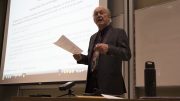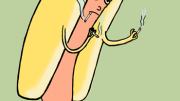Three months ago, the York University administration revoked the official club status of the campus’ Students Against Israeli Apartheid (SAIA) branch, on the grounds that their Mar. 27 rally on the school premises disobeyed noise rules. The Toronto university also prohibited SAIA activist and former York student Hammam Farah from entering the campus.
According to Excalibur, York University’s community newspaper, Janet Morrison, vice-provost students, withdrew SAIA’s official club status until January 2014. The reason given was that the group repeatedly disturbed academic activities on campus.
Revoking the club status of a group prohibits them from using the university’s space and resources.
Regarding the actions of York University, Mark Golden, professor of classics at the University of Winnipeg, said, “What York University has done is a mistake. I believe the university overreacted on this issue.”
Liz Carlyle, co-chair of Winnipeg Coalition Against Israeli Apartheid (WCAIA), said, “their main goal [was] to hamper the groups, and silence an inconvenient point of view, regardless of the scholarship behind these views [ . . . ] students and staff on campuses will see these moves for what they are – abuse[s] of power,” in reference to the York ban.
When asked whether SAIA poses any threat to the academic culture, Carlyle said, “to the contrary, SAIA enhances academic culture as it seeks to address a human rights concern that is very much repressed and misrepresented in North America.”
“SAIA approaches the issues in a respectful, direct way,” continued Carlyle. “SAIA’s main concern is promoting Palestinian human rights, an end to Israel’s apartheid system for Palestinians (and some other groups), colonialism and occupation, and peace in Israel-Palestine. This might be hard for some people to hear, but it is certainly an important discussion to have.”
A similar ban was imposed by the University of Manitoba Students’ Union (UMSU) on the U of M’s Students Against Israeli Apartheid (SAIA) chapter, this past April, which resulted in much debate over the right to free speech. According to Carlyle, the actions of UMSU and York University have put freedom of speech and expression in danger.
“At York University, the administration no doubt has a direct concern about private donations, and is, in any case, a very interventionist administration. York University’s other greatest hits include arresting anti-corporatization protesters and infamously digging in against academic workers in a very long strike,” said Carlyle.
According to Brian Latour, co-chair of Winnipeg Coalition Against Israeli Apartheid along with Carlyle, “the actions of UMSU and the York University administration has set a chilling precedent, and they put a severe damper on students’ right to freedom of expression.”
“This puts a chilling effect on discussion of this issue, because many people are prevented from speaking out, and others are afraid to speak out because they are afraid that they will be the target of these smears,” said Latour.
“More importantly, it’s students’ right to speak out and organize against oppression which is being infringed upon,” added Latour. “The right to speak out against oppression and criticize state policies which support said oppression is one of the most fundamental aspects of free speech.”
“Imagine how much more difficult it would be to fight oppression if students were barred from speaking out against racism, sexism, or homophobia, or if universities and student unions tried to censor and ban anti-apartheid groups during the struggle against South African apartheid,” Latour reflected.
Latour pointed out that some Canadian interests benefit from the maintenance of Israeli apartheid: “There are a lot of people within the political and business establishment that don’t want to see people tugging on these strings.”
The SAIA bans at York and the U of M continue to fuel debate over the limits of freedom of speech in acamedic settings. It remains to be seen whether they have now set a precedent that other Canadian universities will follow.




